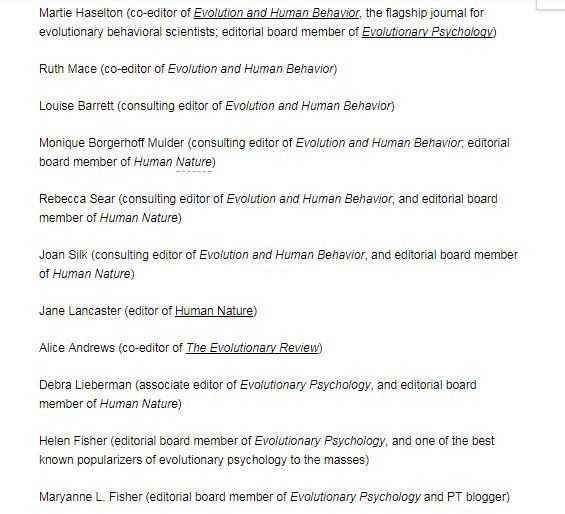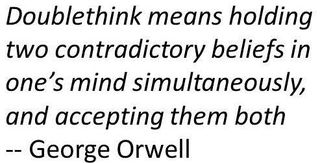Bias
The Psychology of the New McCarthyism
Blacklisting: The reemergence of an old evil.
Posted August 11, 2017

Google fired James Damore for authoring a memo circulated in Google and beyond that promotes views Google disagreed with, and found offensive and/or bigoted (even though a slew of scientific experts have now weighed in suggesting that, especially for an amateur, many of his claims were ballpark accurate and there was little bigotry there; go here for many sources, and go to this Heterodox blog for the best single source).
His main stated goal was to start a discussion about the effectiveness of various diversity programs. Although not all academics agree with the benevolence of Damore’s conclusions, the fact that there is disagreement among academics mean the points are, at least, debatable and worth discussing.
But he was fired.
To be sure, Google is a private corporation. Within very few legal parameters, they have the right to fire anybody they want for almost any reason they choose. All those Hollywood companies in the 1950s had the right to blacklist those accused of Communism. White Supremacists have the right to parade down streets with posters declaring "Hitler was right." One can have the right to do something that is nonetheless wrong.
Quillette.com is what used to be called a small (in a good way) intellectual magazine. It describes itself this way: "At Quillette we respect ideas. Even dangerous ones. We feature writing from non-journalists and strive to give writers freedom to take risks and express controversial ideas."
Quillette invited four academics (including me) to weigh in on the science of Damore’s memo. To Google’s surprise, and, indeed, to the surprise of much of the leftwing echo chamber, even though all four of us agreed that his essay was not perfect, and sometimes went too far, we also agreed that he got much of the science right, and there was little or no racism or sexism there.
Quillette.com was then shut down due to a Denial of Service Attack by hackers.
Denial of Service attack. To a platform for ideas. This is a high-tech manifestation of some very old tactics.

Intimidation. Harassment. Censorship. Blacklisting. Bookburning. From Orwell's 1984: "If you want a picture of the future, imagine a boot stamping on a human face—forever."
Over the last 10 years, there has been a rising tide of leftist intolerance on campuses. It has resulted in harassment, disinvitations, deplatforming, and even violence directed at speakers from politically conservative backgrounds. Even nonconservative speakers who present perspectives challenging leftist sacred cows, such as affirmative action, diversity programs, feminism, microaggression training, bias response teams, and the like have been subject to these aggressive, intolerant, proto-authoritarian tactics.
Or how about this: My Title IX Inquisition. A prominent feminist scholar was relentlessly harassed by students and the Northwestern University administration legal and bias teams for having the unmitigated gall to publish an essay arguing that romantic liaisons between faculty and students should not be prohibited. She was never accused of actually having such a liaison, or of directing any harassment at any individual student. She just published a damn essay with a controversial view.
To be sure, this rising tide of leftist authoritarianism is definitely not endorsed by all, or, I suspect, most liberals. When former President Obama spoke at Rutgers, he said this:
"... it also means listening to those who don't agree with you. I know a couple years ago, folks on this campus [Rutgers] got upset that Condoleezza Rice was supposed to speak at a commencement. Now, I don't think it's a secret that I disagree with many of the foreign policies of Dr. Rice and the previous administration. But the notion that this community or the country would be better served by not hearing from a former Secretary of State, or shutting out what she had to say — I believe that's misguided. I don't think that's how democracy works."
Other well-known liberals, such as NYTimes columnists Frank Bruni and Nicholas Kristof have also spoken out against the rising tide of liberal intolerance. And yet, the harassment of speakers continues, Damore was not merely harassed, he was fired, and many liberals and academics have endorsed that firing.
We have entered very dangerous territory here. Although there are many differences, there are also disturbing parallels between these events, medieval witch hunts, and 1950s era McCarthyism and blacklisting.
THE INTELLECTUAL “JUSTIFICATION” FOR BLACKLISTS
The witch hunts of the 1600s and 1700s often constituted little more than justifications to get rid of people those in power did not like and/or whose property they coveted. Without a lot more detail, it is hard to know what happened at Google. There are all sorts of reasons Damore might have been fired.
In the late 1940s and 1950s, the righteous justification for blacklists was in the name of fighting Communism. For those of you not familiar with this sordid history, large numbers of Americans lost their jobs and suffered harassment in the name of fighting communism during the 1940s and 1950s.1
Some were blacklisted, meaning “No one would hire them.” This time, should blacklists come, they will be in the name of fighting sexism and racism. The Google/Damore episode is disturbing because it could signal the beginning of a new similar American nightmare.
SOCIAL "JUSTICE" AS "JUSTIFICATION" FOR BLACKLISTS

I support nearly all social justice objectives. Demographic discrimination is revolting and warrants well-considered vigilance, and proactive steps to combat. People should have equal opportunities for everything from education to employment. They do not for all sorts of reasons that go well beyond this blog. I have chaired my Department’s Diversity Committee to advance those goals. When I became Department Chair, I instituted a slew of hiring procedures designed to minimize, preferably eliminate, such biases, without engaging in preferential selection. That process produced quite a diversity of hires, also a topic for another blog. My only point is that nothing that follows next justifies or should be interpreted by you as justification for, bias and discrimination.
Nonetheless, too many of the efforts, policies, procedures, programs and rhetoric often endorsed by social justice advocates fundamentally threaten the central core of the entire academic enterprise. Social justice often trumps truth and, ironically, has been used to justify trampling basic human rights.
Let’s start with truth: The core mission of science, including social sciences, is to discover things that are actually true. Anything else is politics, morals, or personal preferences masquerading as science.
IF THE PAPER FINDS BIAS, CITE IT! OTHERWISE IGNORE IT!
Citation counts are one very common measure of how “important” a scholarly publication is. When others cite one’s work they are usually acknowledging its importance and drawing on its ideas. More citations, more influence and importance.
Now consider the storybook image of the scientist as someone who strives for objectivity. If it were true, studies of comparable scientific quality will be similarly influential, even if they produce different outcomes, because they both have comparable claims to reveal something true. But this is not the case. Papers in my home discipline of social psychology that can be used to craft narratives advancing social justice are generally cited far more than papers of equal or even higher scientific quality that contest those narratives. Here are two concrete examples.
When a paper finds stereotype bias, it gets nearly 1,000 citations but when a failed replication of that same study gets published, it gets 30.
When a paper reporting a single study finds evidence of bias against women in STEM it gets 600 citations; when another paper reporting five studies finds gender bias favoring women, it gets 70 citations.
See this paper for several other examples.
HOW TO GET FUNDING BY GRATUITOUSLY TRASHING CHARLES MURRAY

I am sure my colleagues can generate lots of purely objective "scientific" reasons for those differing citation rates. They also generated purely scientific explanations for turning down a grant proposal one of my students submitted a few years ago that was framed as assessing leftist biases in academia.
We decided to test the hypothesis that the scientific criticisms were completely bogus but plausible-sounding justifications for blocking work on liberal biases.
To test this hypothesis, we decided to resubmit the proposal changing nothing in the methods or proposed analyses. In fact, we changed nothing, except a single paragraph. We replaced a paragraph describing the actual scholarship on leftist biases in academia with a paragraph providing a simple, vacuous, and gratuitous condemnation of Nazis, social darwinists and Charles Murray (controversial author of The Bell Curve).
That proposal was funded. Funny how just trashing Nazis, social darwinists and Murray so easily elevated its perceived scientific and methodological merit.

DOUBLE STANDARDS WRIT LARGE
Identical effect sizes (estimates of the size of some difference or causal effect) are "trivial" when being trivial advances social justice and "socially important" when being socially important advances social justice. When Janet Hyde reported "small" gender differences on many attributes, she argued that a difference2 corresponding to an r=.11, meant that men and women are trivially different. This has long been a staple argument in the rhetoric believed to combat sexist discrimination ("If men and women are not different, then there is no justification for discriminating." The implication that there would be justification, if they are different is bizarre).
When Greenwald, Banaji, and Nosek reviewed evidence that implicit prejudice predicts discrimination they concluded that effects as small as r=.11 are "socially important." This also advances an egalitarian narrative because it testifies to the importance of ongoing oppression, that, of course, requires all sorts of interventions to prevent.
If we had an honest field, there would now be a debate between Hyde and Greenwald or Banaji that goes like this:
Hyde: Bias effects of r=.11 are trivially small.
G&B: Sex differences of r=.11 are "socially important."
However, there will never be such a debate. Why? Because both were casting egalitarian narratives. Because for Hyde to argue that G&B effects are “trivially small” she would have to contest an egalitarian narrative emphasizing the power of bias; and for G&B to argue that Hyde’s effects are “socially important” they would have to argue against an egalitarian narrative about allegedly trivial sex differences.
This reminds me of Animal Farm. Equal effects are claimed to mean something different, if that difference advances a political goal.
STEREOTYPE (IN?)ACCURACY
Social psychologists in my field have been declaring stereotypes inaccurate for nearly 100 years. Over the last 30 years or so, the data have rolled in showing...not so much:

Psychologists love to claim we are a “true science” (whatever that means) and one of the rhetorical devices for doing so is the supporting claim that, when we get something wrong, we self-correct.
Once the data came in, did all those proclamations that stereotypes are inaccurate self-correct? Not so much.This evidence contests a common egalitarian narrative (about the evils of stereotyping). So, even though it was "important" to proclaim stereotypes to be inaccurate (usually with no evidence whatsoever) for nearly 100 years, now that the evidence refutes that claim, it is now proclaimed that studying the accuracy of stereotypes is neither interesting nor important. If you have any doubts that this is exactly what has happened, see the quotes and sources in Table 1 here.
There is one way I can think of to make sense of this pattern: Social justice trumps evidence. If the evidence does not advance a social justice agenda, it is "not important."

THE “LEADERSHIP” AT THE IVIES
So much for truth. Let's discuss how dogmatic social justice efforts sometimes trample human rights, academic freedom, and the ability to have reasoned discussions about controversial issues.
The Ivy League universities, with some rare exceptions, now often prioritize social justice more than truth. They are still societal leaders – especially in suppressing and stigmatizing viewpoints that contest specific social justice rhetoric, policies and narratives. Not that long ago, Larry Summers, then president of Harvard acknowledged that discrimination causes some portion of gender gaps, but also speculated that gender gaps could be caused by factors other than discrimination. This generated a massive backlash among Harvard faculty, and he was forced out of the office not too long afterward. Remind you of any current events?
The Ivies include some of the most repressive schools in the country when it comes to intellectual diversity. Don't get me wrong. Just as a devout Catholic in the Middle Ages could express as much love for the Church as s/he liked and would never experience any speech oppression at all, just as a 1930s era Russian could criticize the Soviet Union for not being Stalinist enough, as long as you hold and express leftist views and advance leftist narratives, you have ample freedom at Harvard, Yale, and Brown (do a search for these schools on this page rating universities' records with respect to viewpoint diversity).
PUNISHMENT IS FREEDOM
Or consider this: Columbia Business School professor and social psychologist Adam Galinsky recently published an essay in Fortune in support of the Damore firing. Here is Galinsky from the piece:
In his memo to Google employees, Pichai claimed that Google supports free speech but that Damore’s words were themselves not protected because of their clear and present danger. He wrote that Damore’s biological arguments were “contrary to our basic values and our Code of Conduct, which expects ‘each Googler to do their utmost to create a workplace culture that is free of harassment, intimidation, bias and unlawful discrimination.’” Pichai is right: A biological explanation for sex differences implicitly endorses separation and offers justifications for discrimination. Biological explanations for sex differences create a clear and present danger to inclusion. Thus, Damore’s diversity of ideas was so problematic because it had the potential to limit the diversity of people.
My reading of this is that the mere discussion of biological explanations of sex differences is tantamount to discrimination, and justifies firing. If there ever was a threat to open speech, discussion of controversial ideas, and academic freedom, you are looking right at it.
Now, to his credit, when I contacted Galinsky via email, he informed me that he regretted the “clear and present danger” language. He further stated that he requested that Fortune allow him to remove it, and they refused. We all make mistakes, and, especially when someone acknowledges a mistake, they deserve to be cut some slack. I hope Galinsky will publicly clarify his analysis.
Nonetheless, Galinsky did not retract his claim that discussing evidence of biological explanations for group differences is inherently discriminatory or, at least, provides support for discrimination. Nor did he retract his claim that, as such, it constitutes justification for firing Damore.
If others take Galinsky's analysis seriously, it has horrific implications. It provides a "justification" for firing hundreds, perhaps thousands, of faculty studying evolutionary and biological bases of group differences in social and cognitive outcomes. Here is one list of the women who should, according to this analysis, be fired (a much longer list can be found here):

Of course, the victims of a policy of firing people who study or publicly discuss the biological bases of group differences would include far more people than this, including many men.

Galinsky ended his essay with this statement that struck me as right out of 1984:
But hopefully the successful handling of this crisis will lead to more frank conversations that produce more innovative solutions in the near future.
So in my email, I asked Galinsky one more question:
Why do you believe that firing someone for attempting to frankly discuss these issues has any chance of leading to more frank discussions?
He did not respond to this question. 1984, 2017-style: "Punishment is Freedom."
IT IS NOT JUST THE IVIES
Berkeley has had recurring instances of violent protests shutting down nonleft speakers. Middlebury College erupted into violence when Charles Murray was invited to speak there. You might be interested in my experience at Stanford when I gave a talk there a few years ago.
Lisa Feldman Barrett, a social psychologist at Northeastern University, recently argued that, often enough, speech is actually violence. Although she did not explicitly advocate censorship, once you go down that road, justification for censorship and blacklisting is just a hop, skip, and a jump away.

Not that I am claiming Rutgers, my home institution, is any better. At Rutgers, you can have Angela Davis speak to an enthusiastic audience. But Milo Yianopoulos or Condeleeza Rice? Not so much. And by "not so much" I mean you get protested, prevented from coming, and/or disrupted. We also have "microaggression training," despite the fact that there never has been much in the way of actual scientific validation of much about microaggressions. In fact, you might want to report me to Rutgers' "bias response team" because simply contesting the validity of microaggressions can itself be considered a microaggression. If you are not White, and I ask you, "Where are you from?" I am supposedly committing a microaggression. If I say, in public, that I think "the best person should get the job," I am supposedly committing a microaggression. I may be committing a supposed microaggression by writing this essay.
Given that I am arguing that biological bases of group differences is a reasonable thing to discuss, both in scholarly and lay circles, both Google CEO Pichai and professor Galinsky have provided "justification" for firing me. I wonder if Dr. Barrett believes that this essay is "violence." The shutdown protesters at places like Middlebury and Berkeley have often justified their actions by claiming that the speakers' perspectives would "harm" them.
Fortunately, this sort of repression is not the whole story. Steven Pinker is at Harvard, and he is the foremost opponent of the Blank Slatism that fuels so much misinterpretation of biology as bigotry. And, of course, I am at Rutgers, and, frankly, have been (mostly) treated well and love my job there. But just as the election of Barack Obama did not signal the end of racism, the fact that some scientists have some success in this system does not mean the system is hale and whole.
If you think I am exaggerating or overstating the rise of Blacklist McCarthyism on the Left, consider this: Google fired Damore for expressing his viewpoints.
"Oh," you might say, "But that was Google. Nothing like that would ever happen elsewhere, especially not academia." If you were thinking that, you might want to consider this paper (how intelligence researcher Linda Gottfredson was almost hounded out of her job) or this one (on the disturbingly high levels of explicit endorsement of discrimination against conservatives in social psychology).
I have a forthcoming chapter on the experiences of conservatives in social psychology, and, for some, it has been a nightmare that has driven them out of academia. And if you have any doubt about that, please check out my earlier blogs titled Liberal Bias: Personal Experience I, II, & III.
It is not as bad as McCarthyism and the blacklists yet, and I hope we can keep it that way. But my view is that the difference is narrowing rapidly. Of course, as long as you were a rabid redbaiter in 1950, you would never have noticed; and as long as you tow the "right" (and by "right" I mean dogmatic social justice "left") line now, you won't notice.
The question is this: Is Blacklisting and the New McCarthyism really the way we want to run (ruin?) our universities? Our scientific disciplines? Our major corporations? Our wider society? And, returning to the psychology of it all, it is very easy to beat our breasts in righteous indignation at the injustices of the Salem Witch Trials and of the (first) McCarthy Era blacklists. But it is far more difficult to recognize that our own intolerance can actually lead us down the same authoritarian path many of us find so revolting when viewed through the distance of history.
If you found this of interest, you might also enjoy these:
- The Google Memo: Race and Gender Gaps and Their Solutions
- Why Brilliant Girls Tend to Favor Non-STEM Careers
- Gender Bias in Science or Biased Claims of Gender Bias?
Footnotes
1 For those of you not familiar with those events, after the Soviet Union conquered Eastern Europe at the close of WWII, it turned all those countries (Poland, Hungary, Romania, Bulgaria, and more) into subservient, vassal Communist states. The Soviet Union and the U.S. became intractable ideological and international opponents, including taking opposite sides on conflicts big and small. This prompted a huge paranoia about Communism in the U.S, including Congressional investigations into whether all sorts of people ever had affiliations with Communists, which ultimately led to the blacklists of thousands of people.
2 r is the Pearson's correlation coefficient, and is one common effect size measure. Without going into lots of detail here, and r=.11 favoring men would mean, e.g, that about 55.5% of men are above the mean and 44.5% of women are above the mean. It also means there is a lot of overlap in the distribution of men and women for this trait.
3 I thank Rosell, a commenter below, for suggesting most of these images.

Personal Postscript
Perhaps ironic and amusing, I had a supporting role in my high school play, The Crucible, which used the Salem witch trials as a metaphor and protest against McCarthyism. I played Giles Corey, an old curmudgeon who refused to be cowed by the hysteria, and was eventually executed for supporting those accused of witchcraft. Life imitating art. I am hoping the similarity ends prior to my execution, though.
As usual, please read my guidelines for commenting before doing so. In short, no snark, sarcasm, or insults, and please stay on topic.
For updates on new blog entries here, and pieces by others (including their blogs, editorials, long form essays, and scientific articles) on this and related topics, follow us on Twitter.




